Comprehensive Analysis of Psychology in Health and Social Care Report
VerifiedAdded on 2020/01/15
|13
|4435
|179
Report
AI Summary
This report provides a comprehensive overview of psychology within the context of Health and Social Care (HSC). It begins by defining psychology and its relevance to understanding individuals and groups in HSC settings. The report then delves into various psychological theories of lifespan development, including Erik Erikson's theory of psychosocial development and Kubler-Ross's stages of grief, comparing and contrasting these theories and explaining their application to different life stages. The discussion extends to social and biological factors influencing human behavior, such as socialization, education, and traits, as well as the importance of social roles in HSC environments. The report also analyzes the relationship between psychological theories and behavior disturbances, including addictive behaviors, and examines the application of these theories to individuals experiencing stress and mental health disorders. Finally, it explores how psychological principles can affect behavior change and enhance understanding of relationships in HSC settings.
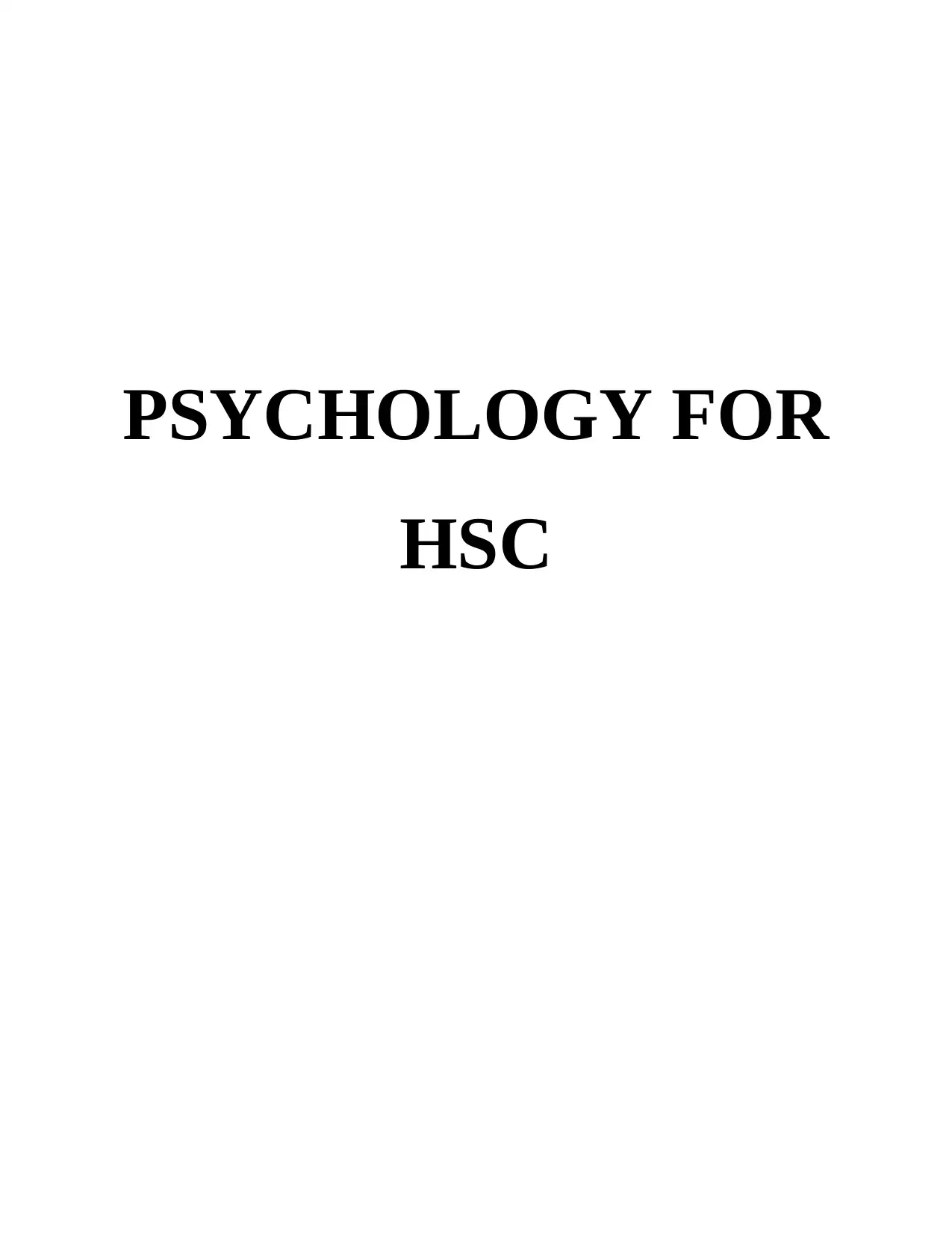
PSYCHOLOGY FOR
HSC
HSC
Paraphrase This Document
Need a fresh take? Get an instant paraphrase of this document with our AI Paraphraser
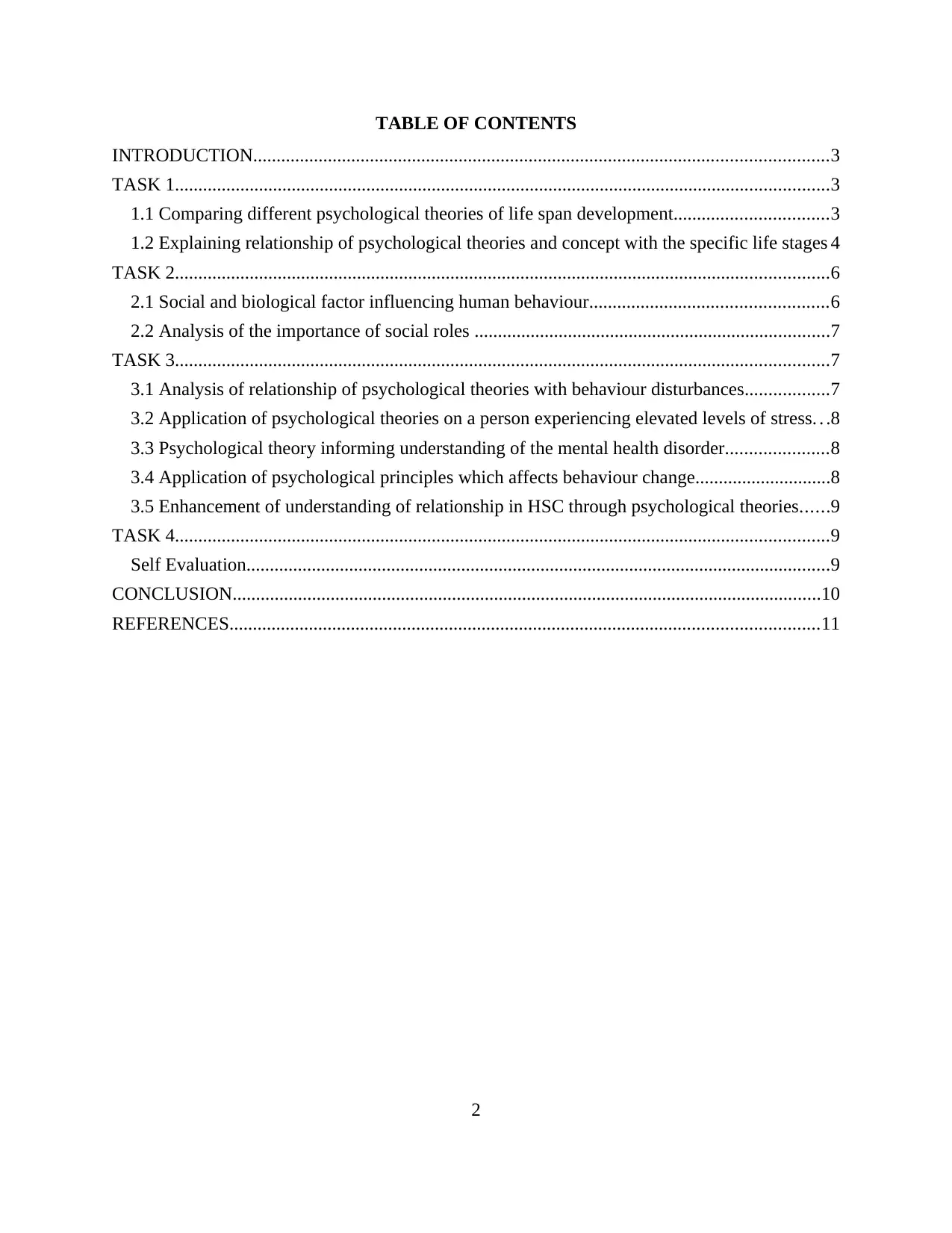
TABLE OF CONTENTS
INTRODUCTION...........................................................................................................................3
TASK 1............................................................................................................................................3
1.1 Comparing different psychological theories of life span development.................................3
1.2 Explaining relationship of psychological theories and concept with the specific life stages 4
TASK 2............................................................................................................................................6
2.1 Social and biological factor influencing human behaviour...................................................6
2.2 Analysis of the importance of social roles ............................................................................7
TASK 3............................................................................................................................................7
3.1 Analysis of relationship of psychological theories with behaviour disturbances..................7
3.2 Application of psychological theories on a person experiencing elevated levels of stress. . .8
3.3 Psychological theory informing understanding of the mental health disorder......................8
3.4 Application of psychological principles which affects behaviour change.............................8
3.5 Enhancement of understanding of relationship in HSC through psychological theories......9
TASK 4............................................................................................................................................9
Self Evaluation.............................................................................................................................9
CONCLUSION..............................................................................................................................10
REFERENCES..............................................................................................................................11
2
INTRODUCTION...........................................................................................................................3
TASK 1............................................................................................................................................3
1.1 Comparing different psychological theories of life span development.................................3
1.2 Explaining relationship of psychological theories and concept with the specific life stages 4
TASK 2............................................................................................................................................6
2.1 Social and biological factor influencing human behaviour...................................................6
2.2 Analysis of the importance of social roles ............................................................................7
TASK 3............................................................................................................................................7
3.1 Analysis of relationship of psychological theories with behaviour disturbances..................7
3.2 Application of psychological theories on a person experiencing elevated levels of stress. . .8
3.3 Psychological theory informing understanding of the mental health disorder......................8
3.4 Application of psychological principles which affects behaviour change.............................8
3.5 Enhancement of understanding of relationship in HSC through psychological theories......9
TASK 4............................................................................................................................................9
Self Evaluation.............................................................................................................................9
CONCLUSION..............................................................................................................................10
REFERENCES..............................................................................................................................11
2
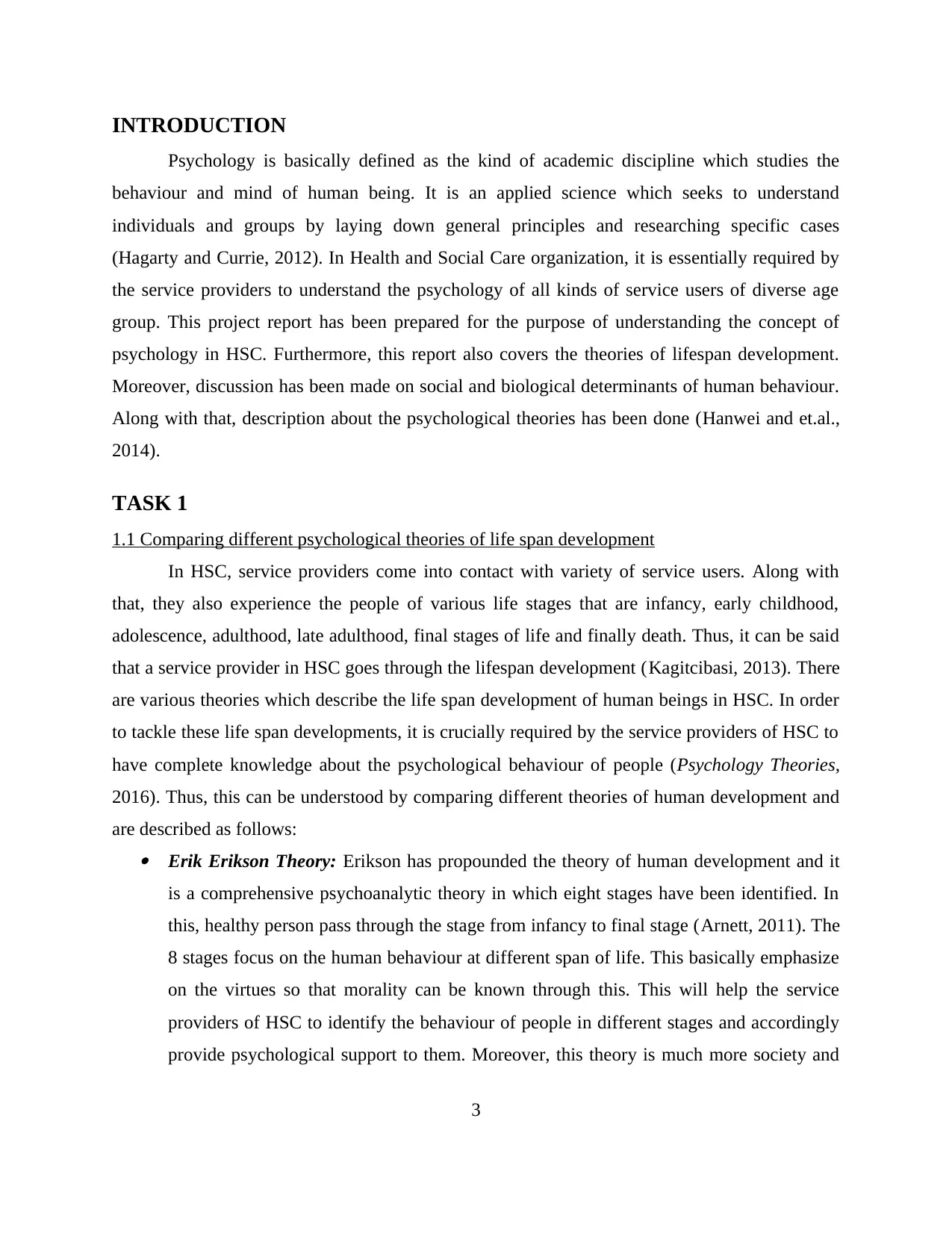
INTRODUCTION
Psychology is basically defined as the kind of academic discipline which studies the
behaviour and mind of human being. It is an applied science which seeks to understand
individuals and groups by laying down general principles and researching specific cases
(Hagarty and Currie, 2012). In Health and Social Care organization, it is essentially required by
the service providers to understand the psychology of all kinds of service users of diverse age
group. This project report has been prepared for the purpose of understanding the concept of
psychology in HSC. Furthermore, this report also covers the theories of lifespan development.
Moreover, discussion has been made on social and biological determinants of human behaviour.
Along with that, description about the psychological theories has been done (Hanwei and et.al.,
2014).
TASK 1
1.1 Comparing different psychological theories of life span development
In HSC, service providers come into contact with variety of service users. Along with
that, they also experience the people of various life stages that are infancy, early childhood,
adolescence, adulthood, late adulthood, final stages of life and finally death. Thus, it can be said
that a service provider in HSC goes through the lifespan development (Kagitcibasi, 2013). There
are various theories which describe the life span development of human beings in HSC. In order
to tackle these life span developments, it is crucially required by the service providers of HSC to
have complete knowledge about the psychological behaviour of people (Psychology Theories,
2016). Thus, this can be understood by comparing different theories of human development and
are described as follows: Erik Erikson Theory: Erikson has propounded the theory of human development and it
is a comprehensive psychoanalytic theory in which eight stages have been identified. In
this, healthy person pass through the stage from infancy to final stage (Arnett, 2011). The
8 stages focus on the human behaviour at different span of life. This basically emphasize
on the virtues so that morality can be known through this. This will help the service
providers of HSC to identify the behaviour of people in different stages and accordingly
provide psychological support to them. Moreover, this theory is much more society and
3
Psychology is basically defined as the kind of academic discipline which studies the
behaviour and mind of human being. It is an applied science which seeks to understand
individuals and groups by laying down general principles and researching specific cases
(Hagarty and Currie, 2012). In Health and Social Care organization, it is essentially required by
the service providers to understand the psychology of all kinds of service users of diverse age
group. This project report has been prepared for the purpose of understanding the concept of
psychology in HSC. Furthermore, this report also covers the theories of lifespan development.
Moreover, discussion has been made on social and biological determinants of human behaviour.
Along with that, description about the psychological theories has been done (Hanwei and et.al.,
2014).
TASK 1
1.1 Comparing different psychological theories of life span development
In HSC, service providers come into contact with variety of service users. Along with
that, they also experience the people of various life stages that are infancy, early childhood,
adolescence, adulthood, late adulthood, final stages of life and finally death. Thus, it can be said
that a service provider in HSC goes through the lifespan development (Kagitcibasi, 2013). There
are various theories which describe the life span development of human beings in HSC. In order
to tackle these life span developments, it is crucially required by the service providers of HSC to
have complete knowledge about the psychological behaviour of people (Psychology Theories,
2016). Thus, this can be understood by comparing different theories of human development and
are described as follows: Erik Erikson Theory: Erikson has propounded the theory of human development and it
is a comprehensive psychoanalytic theory in which eight stages have been identified. In
this, healthy person pass through the stage from infancy to final stage (Arnett, 2011). The
8 stages focus on the human behaviour at different span of life. This basically emphasize
on the virtues so that morality can be known through this. This will help the service
providers of HSC to identify the behaviour of people in different stages and accordingly
provide psychological support to them. Moreover, this theory is much more society and
3
⊘ This is a preview!⊘
Do you want full access?
Subscribe today to unlock all pages.

Trusted by 1+ million students worldwide
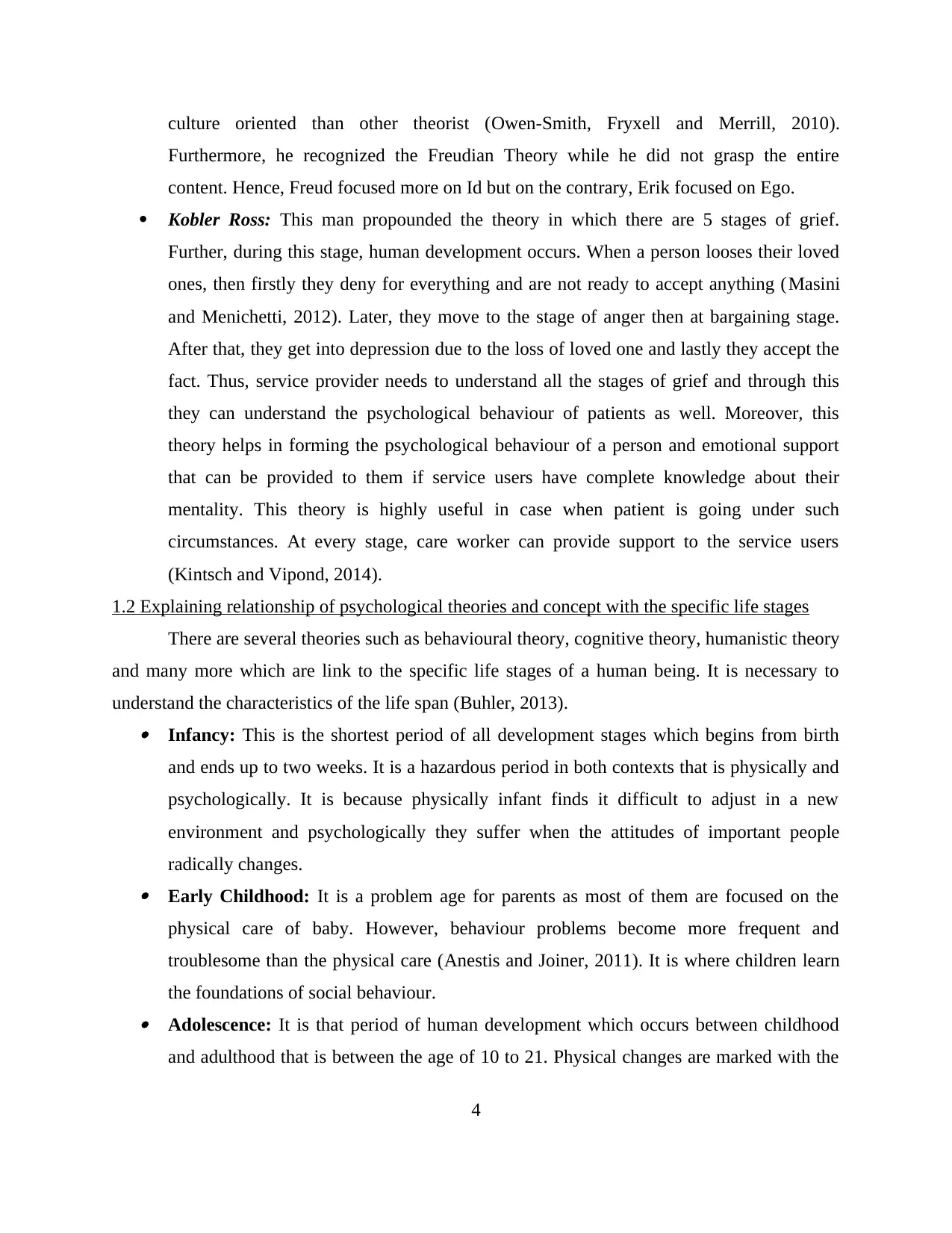
culture oriented than other theorist (Owen-Smith, Fryxell and Merrill, 2010).
Furthermore, he recognized the Freudian Theory while he did not grasp the entire
content. Hence, Freud focused more on Id but on the contrary, Erik focused on Ego.
Kobler Ross: This man propounded the theory in which there are 5 stages of grief.
Further, during this stage, human development occurs. When a person looses their loved
ones, then firstly they deny for everything and are not ready to accept anything (Masini
and Menichetti, 2012). Later, they move to the stage of anger then at bargaining stage.
After that, they get into depression due to the loss of loved one and lastly they accept the
fact. Thus, service provider needs to understand all the stages of grief and through this
they can understand the psychological behaviour of patients as well. Moreover, this
theory helps in forming the psychological behaviour of a person and emotional support
that can be provided to them if service users have complete knowledge about their
mentality. This theory is highly useful in case when patient is going under such
circumstances. At every stage, care worker can provide support to the service users
(Kintsch and Vipond, 2014).
1.2 Explaining relationship of psychological theories and concept with the specific life stages
There are several theories such as behavioural theory, cognitive theory, humanistic theory
and many more which are link to the specific life stages of a human being. It is necessary to
understand the characteristics of the life span (Buhler, 2013). Infancy: This is the shortest period of all development stages which begins from birth
and ends up to two weeks. It is a hazardous period in both contexts that is physically and
psychologically. It is because physically infant finds it difficult to adjust in a new
environment and psychologically they suffer when the attitudes of important people
radically changes. Early Childhood: It is a problem age for parents as most of them are focused on the
physical care of baby. However, behaviour problems become more frequent and
troublesome than the physical care (Anestis and Joiner, 2011). It is where children learn
the foundations of social behaviour. Adolescence: It is that period of human development which occurs between childhood
and adulthood that is between the age of 10 to 21. Physical changes are marked with the
4
Furthermore, he recognized the Freudian Theory while he did not grasp the entire
content. Hence, Freud focused more on Id but on the contrary, Erik focused on Ego.
Kobler Ross: This man propounded the theory in which there are 5 stages of grief.
Further, during this stage, human development occurs. When a person looses their loved
ones, then firstly they deny for everything and are not ready to accept anything (Masini
and Menichetti, 2012). Later, they move to the stage of anger then at bargaining stage.
After that, they get into depression due to the loss of loved one and lastly they accept the
fact. Thus, service provider needs to understand all the stages of grief and through this
they can understand the psychological behaviour of patients as well. Moreover, this
theory helps in forming the psychological behaviour of a person and emotional support
that can be provided to them if service users have complete knowledge about their
mentality. This theory is highly useful in case when patient is going under such
circumstances. At every stage, care worker can provide support to the service users
(Kintsch and Vipond, 2014).
1.2 Explaining relationship of psychological theories and concept with the specific life stages
There are several theories such as behavioural theory, cognitive theory, humanistic theory
and many more which are link to the specific life stages of a human being. It is necessary to
understand the characteristics of the life span (Buhler, 2013). Infancy: This is the shortest period of all development stages which begins from birth
and ends up to two weeks. It is a hazardous period in both contexts that is physically and
psychologically. It is because physically infant finds it difficult to adjust in a new
environment and psychologically they suffer when the attitudes of important people
radically changes. Early Childhood: It is a problem age for parents as most of them are focused on the
physical care of baby. However, behaviour problems become more frequent and
troublesome than the physical care (Anestis and Joiner, 2011). It is where children learn
the foundations of social behaviour. Adolescence: It is that period of human development which occurs between childhood
and adulthood that is between the age of 10 to 21. Physical changes are marked with the
4
Paraphrase This Document
Need a fresh take? Get an instant paraphrase of this document with our AI Paraphraser
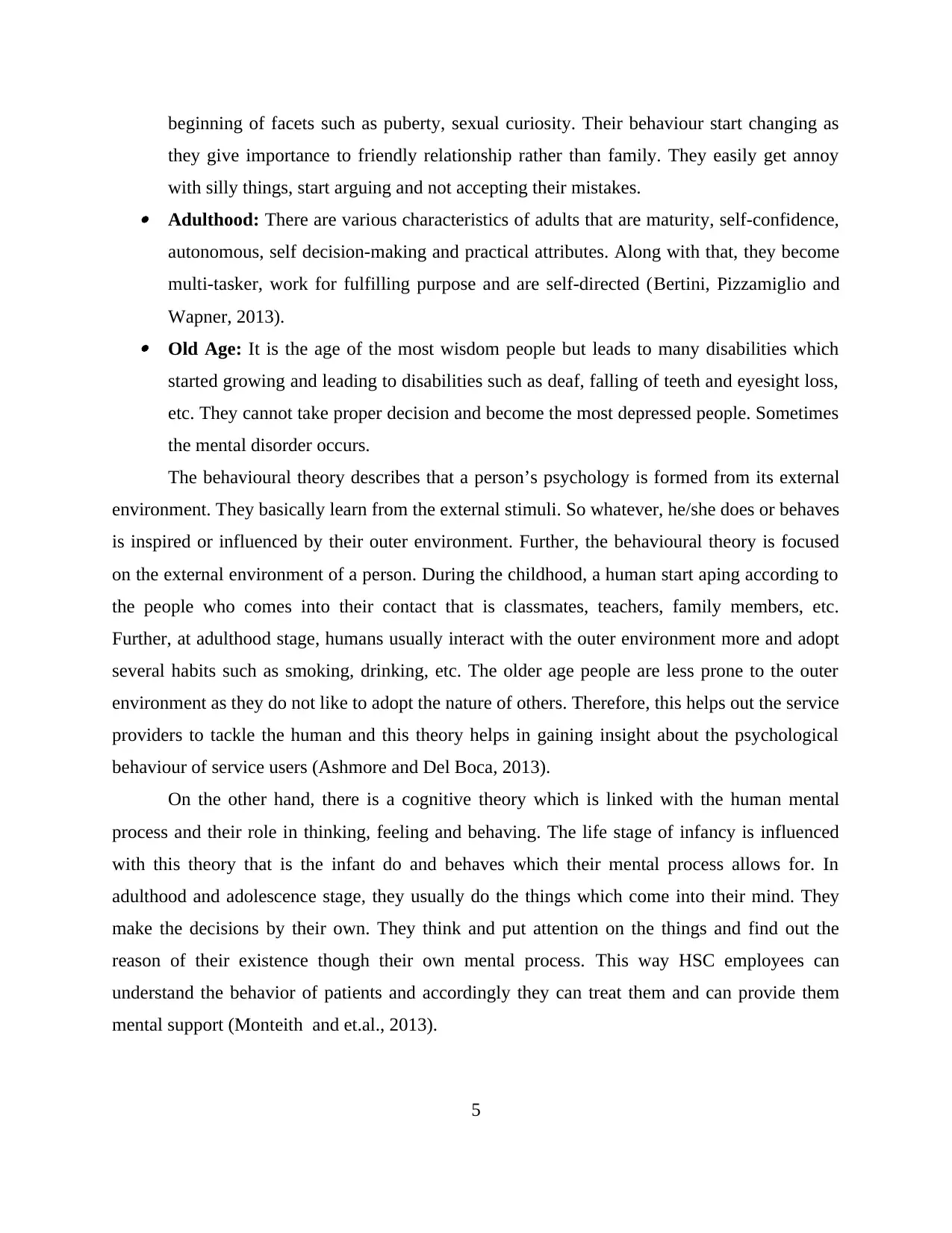
beginning of facets such as puberty, sexual curiosity. Their behaviour start changing as
they give importance to friendly relationship rather than family. They easily get annoy
with silly things, start arguing and not accepting their mistakes. Adulthood: There are various characteristics of adults that are maturity, self-confidence,
autonomous, self decision-making and practical attributes. Along with that, they become
multi-tasker, work for fulfilling purpose and are self-directed (Bertini, Pizzamiglio and
Wapner, 2013). Old Age: It is the age of the most wisdom people but leads to many disabilities which
started growing and leading to disabilities such as deaf, falling of teeth and eyesight loss,
etc. They cannot take proper decision and become the most depressed people. Sometimes
the mental disorder occurs.
The behavioural theory describes that a person’s psychology is formed from its external
environment. They basically learn from the external stimuli. So whatever, he/she does or behaves
is inspired or influenced by their outer environment. Further, the behavioural theory is focused
on the external environment of a person. During the childhood, a human start aping according to
the people who comes into their contact that is classmates, teachers, family members, etc.
Further, at adulthood stage, humans usually interact with the outer environment more and adopt
several habits such as smoking, drinking, etc. The older age people are less prone to the outer
environment as they do not like to adopt the nature of others. Therefore, this helps out the service
providers to tackle the human and this theory helps in gaining insight about the psychological
behaviour of service users (Ashmore and Del Boca, 2013).
On the other hand, there is a cognitive theory which is linked with the human mental
process and their role in thinking, feeling and behaving. The life stage of infancy is influenced
with this theory that is the infant do and behaves which their mental process allows for. In
adulthood and adolescence stage, they usually do the things which come into their mind. They
make the decisions by their own. They think and put attention on the things and find out the
reason of their existence though their own mental process. This way HSC employees can
understand the behavior of patients and accordingly they can treat them and can provide them
mental support (Monteith and et.al., 2013).
5
they give importance to friendly relationship rather than family. They easily get annoy
with silly things, start arguing and not accepting their mistakes. Adulthood: There are various characteristics of adults that are maturity, self-confidence,
autonomous, self decision-making and practical attributes. Along with that, they become
multi-tasker, work for fulfilling purpose and are self-directed (Bertini, Pizzamiglio and
Wapner, 2013). Old Age: It is the age of the most wisdom people but leads to many disabilities which
started growing and leading to disabilities such as deaf, falling of teeth and eyesight loss,
etc. They cannot take proper decision and become the most depressed people. Sometimes
the mental disorder occurs.
The behavioural theory describes that a person’s psychology is formed from its external
environment. They basically learn from the external stimuli. So whatever, he/she does or behaves
is inspired or influenced by their outer environment. Further, the behavioural theory is focused
on the external environment of a person. During the childhood, a human start aping according to
the people who comes into their contact that is classmates, teachers, family members, etc.
Further, at adulthood stage, humans usually interact with the outer environment more and adopt
several habits such as smoking, drinking, etc. The older age people are less prone to the outer
environment as they do not like to adopt the nature of others. Therefore, this helps out the service
providers to tackle the human and this theory helps in gaining insight about the psychological
behaviour of service users (Ashmore and Del Boca, 2013).
On the other hand, there is a cognitive theory which is linked with the human mental
process and their role in thinking, feeling and behaving. The life stage of infancy is influenced
with this theory that is the infant do and behaves which their mental process allows for. In
adulthood and adolescence stage, they usually do the things which come into their mind. They
make the decisions by their own. They think and put attention on the things and find out the
reason of their existence though their own mental process. This way HSC employees can
understand the behavior of patients and accordingly they can treat them and can provide them
mental support (Monteith and et.al., 2013).
5
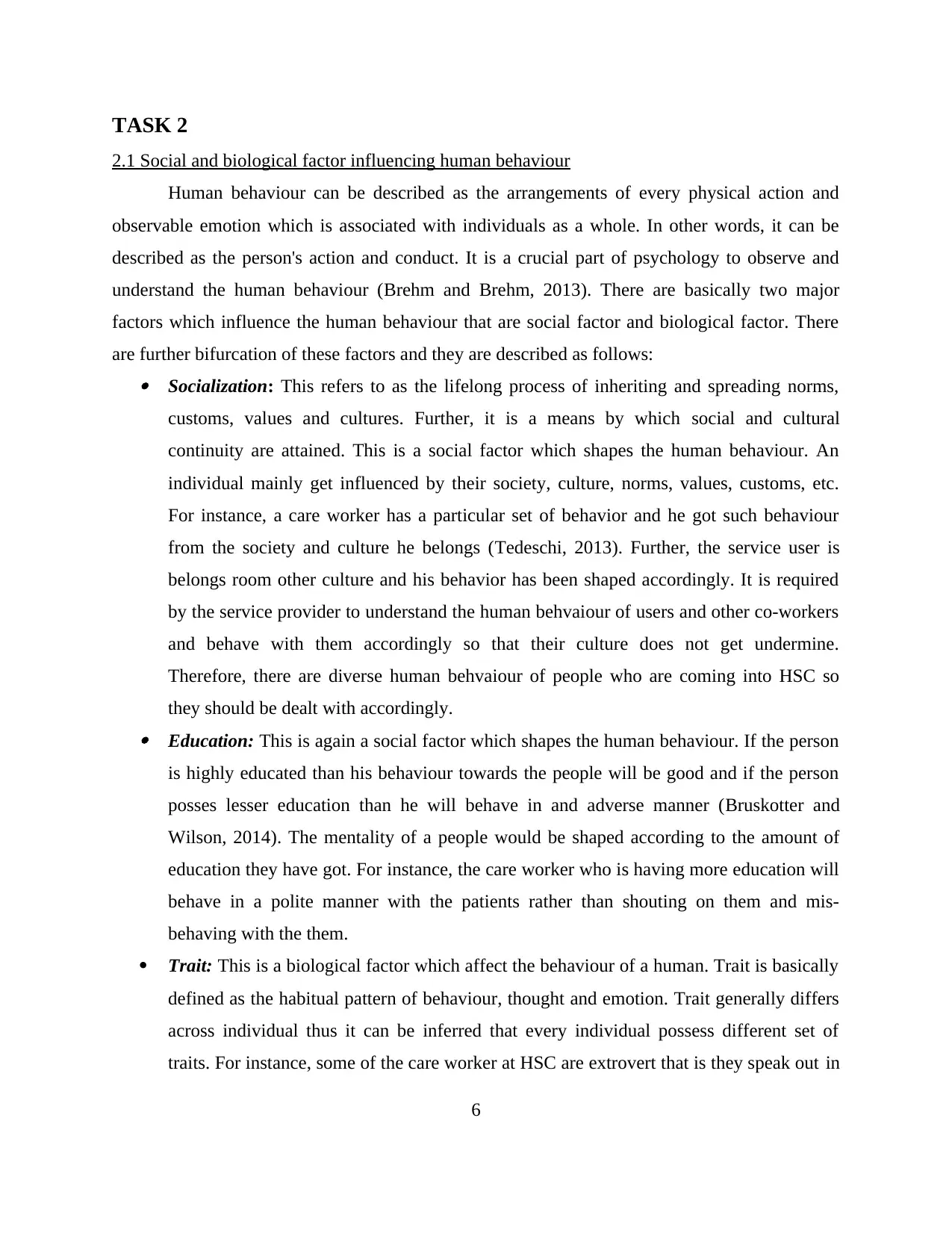
TASK 2
2.1 Social and biological factor influencing human behaviour
Human behaviour can be described as the arrangements of every physical action and
observable emotion which is associated with individuals as a whole. In other words, it can be
described as the person's action and conduct. It is a crucial part of psychology to observe and
understand the human behaviour (Brehm and Brehm, 2013). There are basically two major
factors which influence the human behaviour that are social factor and biological factor. There
are further bifurcation of these factors and they are described as follows: Socialization: This refers to as the lifelong process of inheriting and spreading norms,
customs, values and cultures. Further, it is a means by which social and cultural
continuity are attained. This is a social factor which shapes the human behaviour. An
individual mainly get influenced by their society, culture, norms, values, customs, etc.
For instance, a care worker has a particular set of behavior and he got such behaviour
from the society and culture he belongs (Tedeschi, 2013). Further, the service user is
belongs room other culture and his behavior has been shaped accordingly. It is required
by the service provider to understand the human behvaiour of users and other co-workers
and behave with them accordingly so that their culture does not get undermine.
Therefore, there are diverse human behvaiour of people who are coming into HSC so
they should be dealt with accordingly. Education: This is again a social factor which shapes the human behaviour. If the person
is highly educated than his behaviour towards the people will be good and if the person
posses lesser education than he will behave in and adverse manner (Bruskotter and
Wilson, 2014). The mentality of a people would be shaped according to the amount of
education they have got. For instance, the care worker who is having more education will
behave in a polite manner with the patients rather than shouting on them and mis-
behaving with the them.
Trait: This is a biological factor which affect the behaviour of a human. Trait is basically
defined as the habitual pattern of behaviour, thought and emotion. Trait generally differs
across individual thus it can be inferred that every individual possess different set of
traits. For instance, some of the care worker at HSC are extrovert that is they speak out in
6
2.1 Social and biological factor influencing human behaviour
Human behaviour can be described as the arrangements of every physical action and
observable emotion which is associated with individuals as a whole. In other words, it can be
described as the person's action and conduct. It is a crucial part of psychology to observe and
understand the human behaviour (Brehm and Brehm, 2013). There are basically two major
factors which influence the human behaviour that are social factor and biological factor. There
are further bifurcation of these factors and they are described as follows: Socialization: This refers to as the lifelong process of inheriting and spreading norms,
customs, values and cultures. Further, it is a means by which social and cultural
continuity are attained. This is a social factor which shapes the human behaviour. An
individual mainly get influenced by their society, culture, norms, values, customs, etc.
For instance, a care worker has a particular set of behavior and he got such behaviour
from the society and culture he belongs (Tedeschi, 2013). Further, the service user is
belongs room other culture and his behavior has been shaped accordingly. It is required
by the service provider to understand the human behvaiour of users and other co-workers
and behave with them accordingly so that their culture does not get undermine.
Therefore, there are diverse human behvaiour of people who are coming into HSC so
they should be dealt with accordingly. Education: This is again a social factor which shapes the human behaviour. If the person
is highly educated than his behaviour towards the people will be good and if the person
posses lesser education than he will behave in and adverse manner (Bruskotter and
Wilson, 2014). The mentality of a people would be shaped according to the amount of
education they have got. For instance, the care worker who is having more education will
behave in a polite manner with the patients rather than shouting on them and mis-
behaving with the them.
Trait: This is a biological factor which affect the behaviour of a human. Trait is basically
defined as the habitual pattern of behaviour, thought and emotion. Trait generally differs
across individual thus it can be inferred that every individual possess different set of
traits. For instance, some of the care worker at HSC are extrovert that is they speak out in
6
⊘ This is a preview!⊘
Do you want full access?
Subscribe today to unlock all pages.

Trusted by 1+ million students worldwide
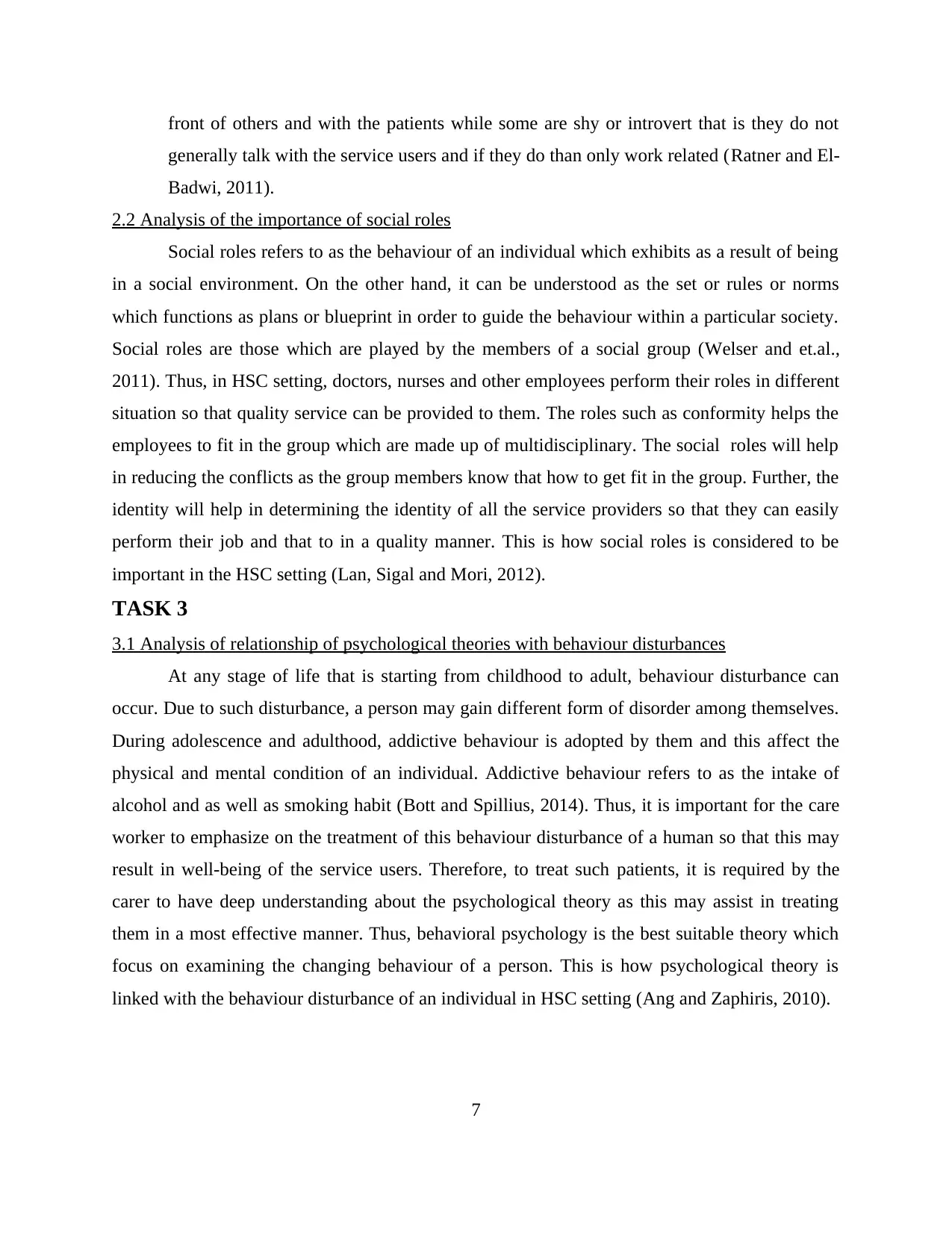
front of others and with the patients while some are shy or introvert that is they do not
generally talk with the service users and if they do than only work related (Ratner and El-
Badwi, 2011).
2.2 Analysis of the importance of social roles
Social roles refers to as the behaviour of an individual which exhibits as a result of being
in a social environment. On the other hand, it can be understood as the set or rules or norms
which functions as plans or blueprint in order to guide the behaviour within a particular society.
Social roles are those which are played by the members of a social group (Welser and et.al.,
2011). Thus, in HSC setting, doctors, nurses and other employees perform their roles in different
situation so that quality service can be provided to them. The roles such as conformity helps the
employees to fit in the group which are made up of multidisciplinary. The social roles will help
in reducing the conflicts as the group members know that how to get fit in the group. Further, the
identity will help in determining the identity of all the service providers so that they can easily
perform their job and that to in a quality manner. This is how social roles is considered to be
important in the HSC setting (Lan, Sigal and Mori, 2012).
TASK 3
3.1 Analysis of relationship of psychological theories with behaviour disturbances
At any stage of life that is starting from childhood to adult, behaviour disturbance can
occur. Due to such disturbance, a person may gain different form of disorder among themselves.
During adolescence and adulthood, addictive behaviour is adopted by them and this affect the
physical and mental condition of an individual. Addictive behaviour refers to as the intake of
alcohol and as well as smoking habit (Bott and Spillius, 2014). Thus, it is important for the care
worker to emphasize on the treatment of this behaviour disturbance of a human so that this may
result in well-being of the service users. Therefore, to treat such patients, it is required by the
carer to have deep understanding about the psychological theory as this may assist in treating
them in a most effective manner. Thus, behavioral psychology is the best suitable theory which
focus on examining the changing behaviour of a person. This is how psychological theory is
linked with the behaviour disturbance of an individual in HSC setting (Ang and Zaphiris, 2010).
7
generally talk with the service users and if they do than only work related (Ratner and El-
Badwi, 2011).
2.2 Analysis of the importance of social roles
Social roles refers to as the behaviour of an individual which exhibits as a result of being
in a social environment. On the other hand, it can be understood as the set or rules or norms
which functions as plans or blueprint in order to guide the behaviour within a particular society.
Social roles are those which are played by the members of a social group (Welser and et.al.,
2011). Thus, in HSC setting, doctors, nurses and other employees perform their roles in different
situation so that quality service can be provided to them. The roles such as conformity helps the
employees to fit in the group which are made up of multidisciplinary. The social roles will help
in reducing the conflicts as the group members know that how to get fit in the group. Further, the
identity will help in determining the identity of all the service providers so that they can easily
perform their job and that to in a quality manner. This is how social roles is considered to be
important in the HSC setting (Lan, Sigal and Mori, 2012).
TASK 3
3.1 Analysis of relationship of psychological theories with behaviour disturbances
At any stage of life that is starting from childhood to adult, behaviour disturbance can
occur. Due to such disturbance, a person may gain different form of disorder among themselves.
During adolescence and adulthood, addictive behaviour is adopted by them and this affect the
physical and mental condition of an individual. Addictive behaviour refers to as the intake of
alcohol and as well as smoking habit (Bott and Spillius, 2014). Thus, it is important for the care
worker to emphasize on the treatment of this behaviour disturbance of a human so that this may
result in well-being of the service users. Therefore, to treat such patients, it is required by the
carer to have deep understanding about the psychological theory as this may assist in treating
them in a most effective manner. Thus, behavioral psychology is the best suitable theory which
focus on examining the changing behaviour of a person. This is how psychological theory is
linked with the behaviour disturbance of an individual in HSC setting (Ang and Zaphiris, 2010).
7
Paraphrase This Document
Need a fresh take? Get an instant paraphrase of this document with our AI Paraphraser
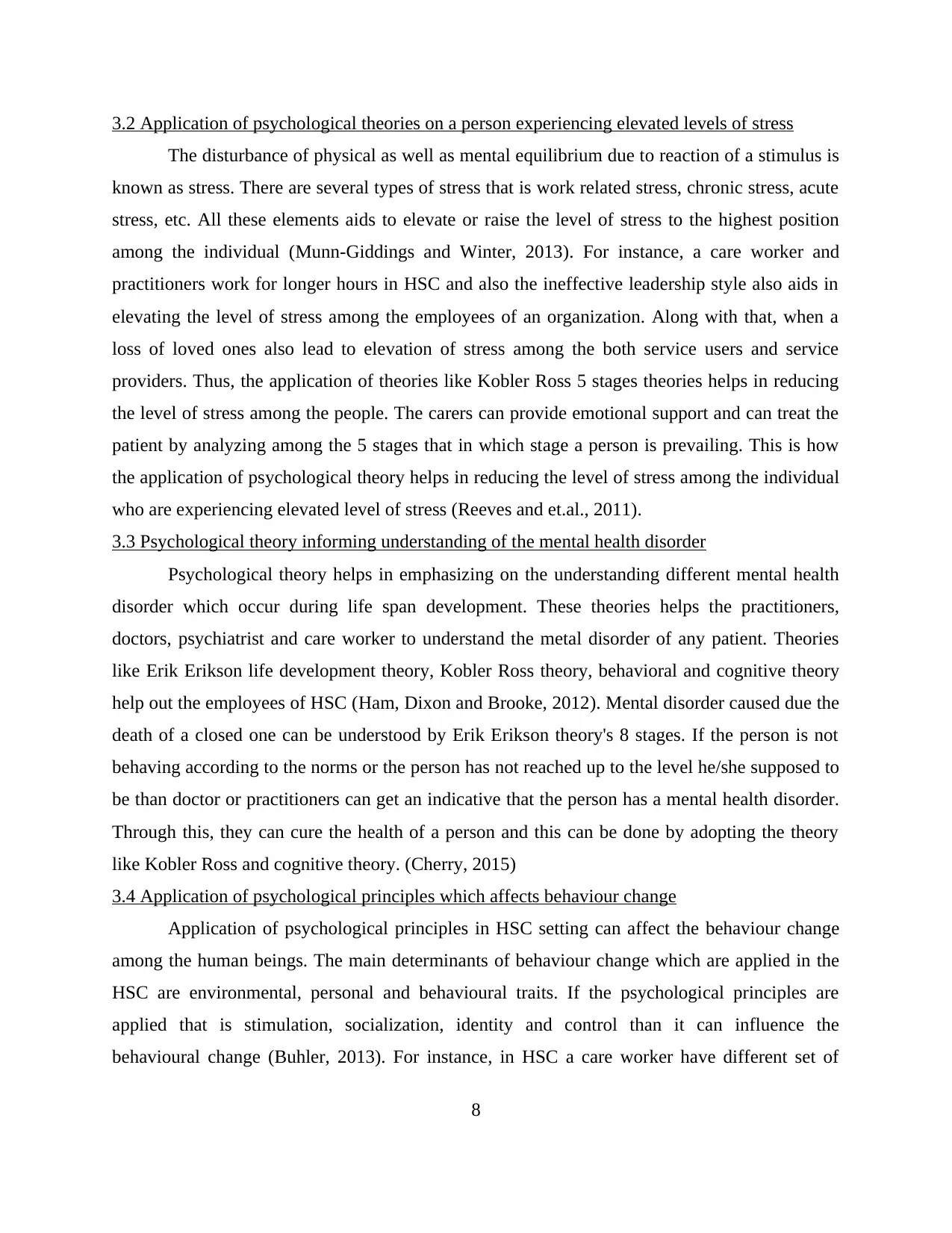
3.2 Application of psychological theories on a person experiencing elevated levels of stress
The disturbance of physical as well as mental equilibrium due to reaction of a stimulus is
known as stress. There are several types of stress that is work related stress, chronic stress, acute
stress, etc. All these elements aids to elevate or raise the level of stress to the highest position
among the individual (Munn-Giddings and Winter, 2013). For instance, a care worker and
practitioners work for longer hours in HSC and also the ineffective leadership style also aids in
elevating the level of stress among the employees of an organization. Along with that, when a
loss of loved ones also lead to elevation of stress among the both service users and service
providers. Thus, the application of theories like Kobler Ross 5 stages theories helps in reducing
the level of stress among the people. The carers can provide emotional support and can treat the
patient by analyzing among the 5 stages that in which stage a person is prevailing. This is how
the application of psychological theory helps in reducing the level of stress among the individual
who are experiencing elevated level of stress (Reeves and et.al., 2011).
3.3 Psychological theory informing understanding of the mental health disorder
Psychological theory helps in emphasizing on the understanding different mental health
disorder which occur during life span development. These theories helps the practitioners,
doctors, psychiatrist and care worker to understand the metal disorder of any patient. Theories
like Erik Erikson life development theory, Kobler Ross theory, behavioral and cognitive theory
help out the employees of HSC (Ham, Dixon and Brooke, 2012). Mental disorder caused due the
death of a closed one can be understood by Erik Erikson theory's 8 stages. If the person is not
behaving according to the norms or the person has not reached up to the level he/she supposed to
be than doctor or practitioners can get an indicative that the person has a mental health disorder.
Through this, they can cure the health of a person and this can be done by adopting the theory
like Kobler Ross and cognitive theory. (Cherry, 2015)
3.4 Application of psychological principles which affects behaviour change
Application of psychological principles in HSC setting can affect the behaviour change
among the human beings. The main determinants of behaviour change which are applied in the
HSC are environmental, personal and behavioural traits. If the psychological principles are
applied that is stimulation, socialization, identity and control than it can influence the
behavioural change (Buhler, 2013). For instance, in HSC a care worker have different set of
8
The disturbance of physical as well as mental equilibrium due to reaction of a stimulus is
known as stress. There are several types of stress that is work related stress, chronic stress, acute
stress, etc. All these elements aids to elevate or raise the level of stress to the highest position
among the individual (Munn-Giddings and Winter, 2013). For instance, a care worker and
practitioners work for longer hours in HSC and also the ineffective leadership style also aids in
elevating the level of stress among the employees of an organization. Along with that, when a
loss of loved ones also lead to elevation of stress among the both service users and service
providers. Thus, the application of theories like Kobler Ross 5 stages theories helps in reducing
the level of stress among the people. The carers can provide emotional support and can treat the
patient by analyzing among the 5 stages that in which stage a person is prevailing. This is how
the application of psychological theory helps in reducing the level of stress among the individual
who are experiencing elevated level of stress (Reeves and et.al., 2011).
3.3 Psychological theory informing understanding of the mental health disorder
Psychological theory helps in emphasizing on the understanding different mental health
disorder which occur during life span development. These theories helps the practitioners,
doctors, psychiatrist and care worker to understand the metal disorder of any patient. Theories
like Erik Erikson life development theory, Kobler Ross theory, behavioral and cognitive theory
help out the employees of HSC (Ham, Dixon and Brooke, 2012). Mental disorder caused due the
death of a closed one can be understood by Erik Erikson theory's 8 stages. If the person is not
behaving according to the norms or the person has not reached up to the level he/she supposed to
be than doctor or practitioners can get an indicative that the person has a mental health disorder.
Through this, they can cure the health of a person and this can be done by adopting the theory
like Kobler Ross and cognitive theory. (Cherry, 2015)
3.4 Application of psychological principles which affects behaviour change
Application of psychological principles in HSC setting can affect the behaviour change
among the human beings. The main determinants of behaviour change which are applied in the
HSC are environmental, personal and behavioural traits. If the psychological principles are
applied that is stimulation, socialization, identity and control than it can influence the
behavioural change (Buhler, 2013). For instance, in HSC a care worker have different set of
8
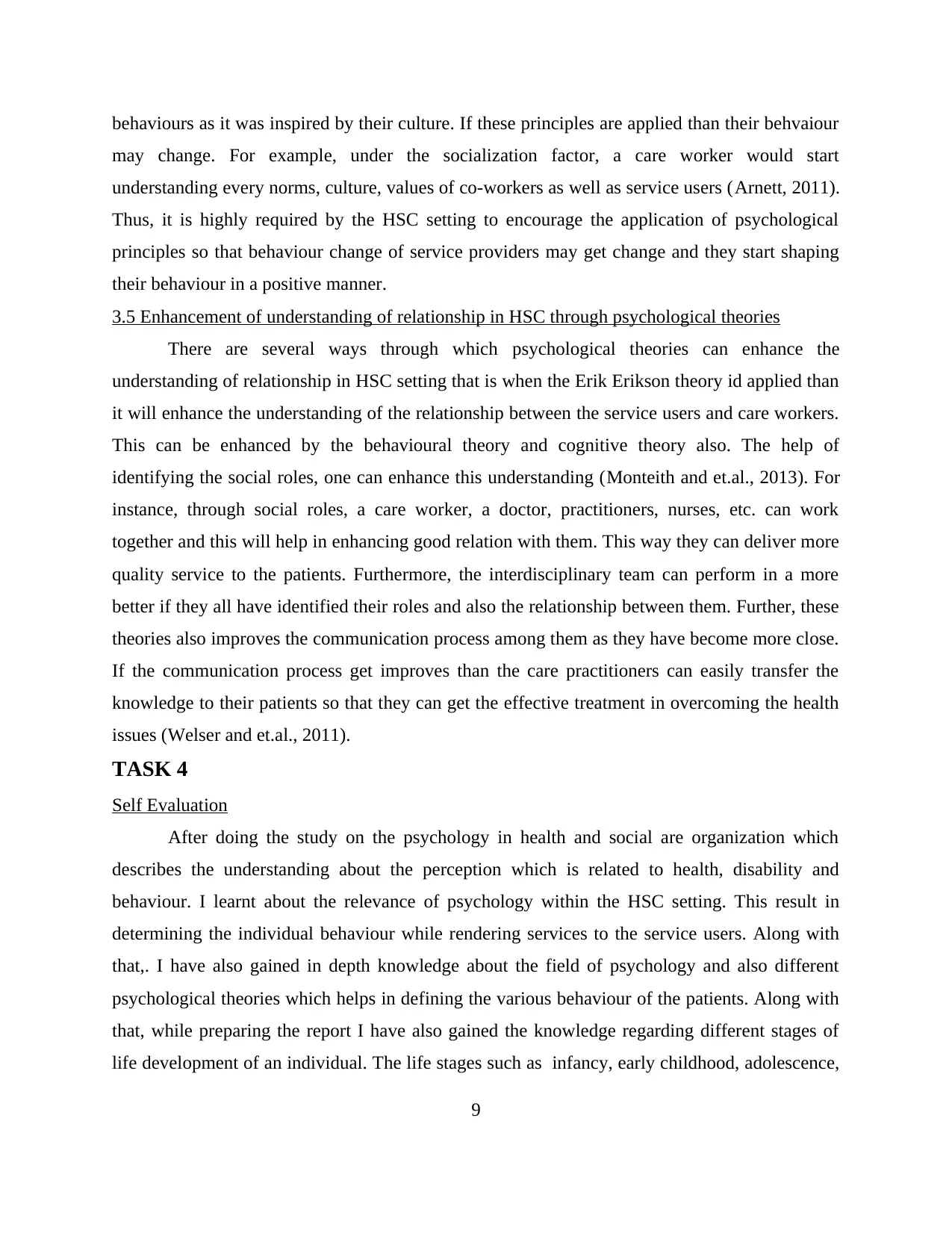
behaviours as it was inspired by their culture. If these principles are applied than their behvaiour
may change. For example, under the socialization factor, a care worker would start
understanding every norms, culture, values of co-workers as well as service users (Arnett, 2011).
Thus, it is highly required by the HSC setting to encourage the application of psychological
principles so that behaviour change of service providers may get change and they start shaping
their behaviour in a positive manner.
3.5 Enhancement of understanding of relationship in HSC through psychological theories
There are several ways through which psychological theories can enhance the
understanding of relationship in HSC setting that is when the Erik Erikson theory id applied than
it will enhance the understanding of the relationship between the service users and care workers.
This can be enhanced by the behavioural theory and cognitive theory also. The help of
identifying the social roles, one can enhance this understanding (Monteith and et.al., 2013). For
instance, through social roles, a care worker, a doctor, practitioners, nurses, etc. can work
together and this will help in enhancing good relation with them. This way they can deliver more
quality service to the patients. Furthermore, the interdisciplinary team can perform in a more
better if they all have identified their roles and also the relationship between them. Further, these
theories also improves the communication process among them as they have become more close.
If the communication process get improves than the care practitioners can easily transfer the
knowledge to their patients so that they can get the effective treatment in overcoming the health
issues (Welser and et.al., 2011).
TASK 4
Self Evaluation
After doing the study on the psychology in health and social are organization which
describes the understanding about the perception which is related to health, disability and
behaviour. I learnt about the relevance of psychology within the HSC setting. This result in
determining the individual behaviour while rendering services to the service users. Along with
that,. I have also gained in depth knowledge about the field of psychology and also different
psychological theories which helps in defining the various behaviour of the patients. Along with
that, while preparing the report I have also gained the knowledge regarding different stages of
life development of an individual. The life stages such as infancy, early childhood, adolescence,
9
may change. For example, under the socialization factor, a care worker would start
understanding every norms, culture, values of co-workers as well as service users (Arnett, 2011).
Thus, it is highly required by the HSC setting to encourage the application of psychological
principles so that behaviour change of service providers may get change and they start shaping
their behaviour in a positive manner.
3.5 Enhancement of understanding of relationship in HSC through psychological theories
There are several ways through which psychological theories can enhance the
understanding of relationship in HSC setting that is when the Erik Erikson theory id applied than
it will enhance the understanding of the relationship between the service users and care workers.
This can be enhanced by the behavioural theory and cognitive theory also. The help of
identifying the social roles, one can enhance this understanding (Monteith and et.al., 2013). For
instance, through social roles, a care worker, a doctor, practitioners, nurses, etc. can work
together and this will help in enhancing good relation with them. This way they can deliver more
quality service to the patients. Furthermore, the interdisciplinary team can perform in a more
better if they all have identified their roles and also the relationship between them. Further, these
theories also improves the communication process among them as they have become more close.
If the communication process get improves than the care practitioners can easily transfer the
knowledge to their patients so that they can get the effective treatment in overcoming the health
issues (Welser and et.al., 2011).
TASK 4
Self Evaluation
After doing the study on the psychology in health and social are organization which
describes the understanding about the perception which is related to health, disability and
behaviour. I learnt about the relevance of psychology within the HSC setting. This result in
determining the individual behaviour while rendering services to the service users. Along with
that,. I have also gained in depth knowledge about the field of psychology and also different
psychological theories which helps in defining the various behaviour of the patients. Along with
that, while preparing the report I have also gained the knowledge regarding different stages of
life development of an individual. The life stages such as infancy, early childhood, adolescence,
9
⊘ This is a preview!⊘
Do you want full access?
Subscribe today to unlock all pages.

Trusted by 1+ million students worldwide
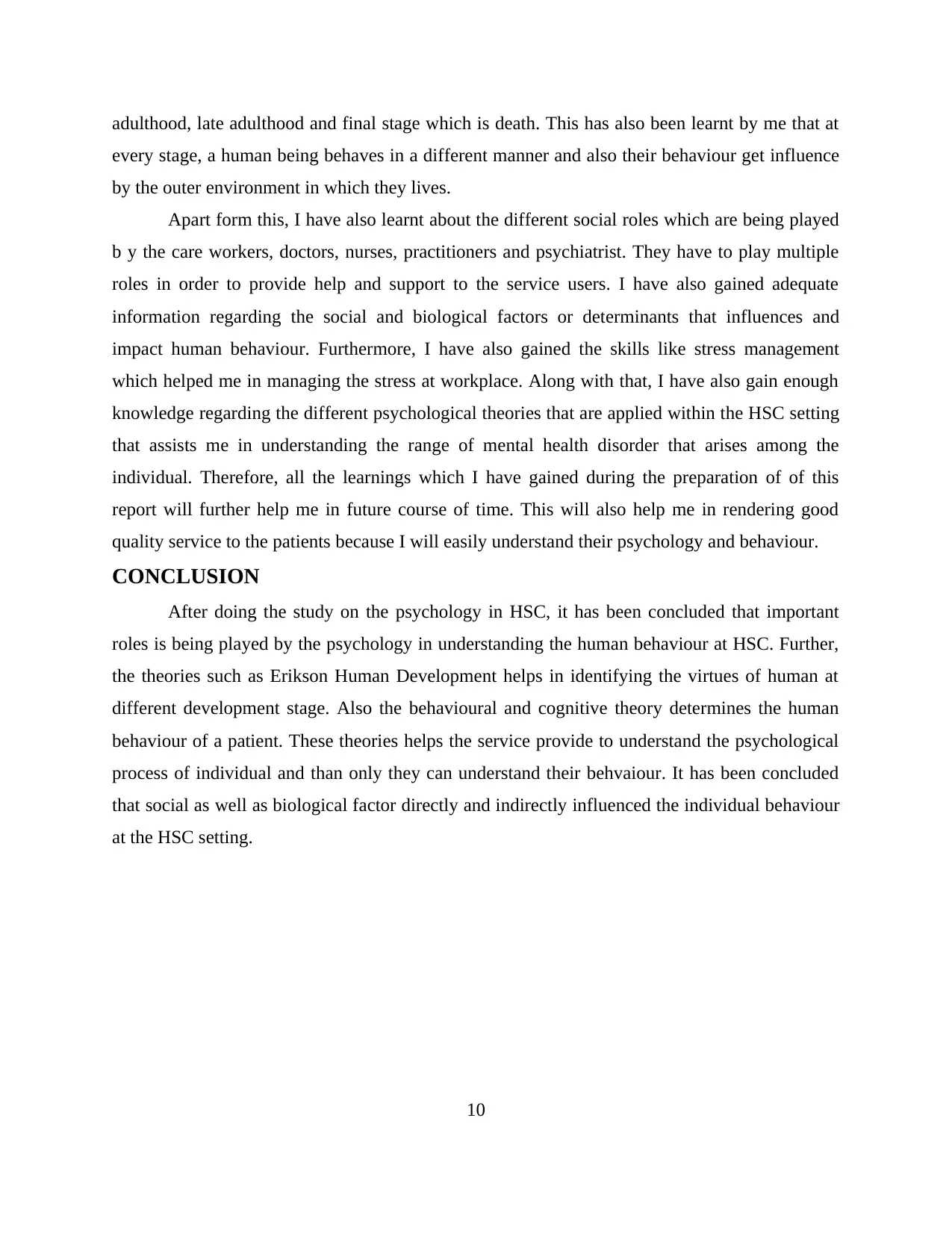
adulthood, late adulthood and final stage which is death. This has also been learnt by me that at
every stage, a human being behaves in a different manner and also their behaviour get influence
by the outer environment in which they lives.
Apart form this, I have also learnt about the different social roles which are being played
b y the care workers, doctors, nurses, practitioners and psychiatrist. They have to play multiple
roles in order to provide help and support to the service users. I have also gained adequate
information regarding the social and biological factors or determinants that influences and
impact human behaviour. Furthermore, I have also gained the skills like stress management
which helped me in managing the stress at workplace. Along with that, I have also gain enough
knowledge regarding the different psychological theories that are applied within the HSC setting
that assists me in understanding the range of mental health disorder that arises among the
individual. Therefore, all the learnings which I have gained during the preparation of of this
report will further help me in future course of time. This will also help me in rendering good
quality service to the patients because I will easily understand their psychology and behaviour.
CONCLUSION
After doing the study on the psychology in HSC, it has been concluded that important
roles is being played by the psychology in understanding the human behaviour at HSC. Further,
the theories such as Erikson Human Development helps in identifying the virtues of human at
different development stage. Also the behavioural and cognitive theory determines the human
behaviour of a patient. These theories helps the service provide to understand the psychological
process of individual and than only they can understand their behvaiour. It has been concluded
that social as well as biological factor directly and indirectly influenced the individual behaviour
at the HSC setting.
10
every stage, a human being behaves in a different manner and also their behaviour get influence
by the outer environment in which they lives.
Apart form this, I have also learnt about the different social roles which are being played
b y the care workers, doctors, nurses, practitioners and psychiatrist. They have to play multiple
roles in order to provide help and support to the service users. I have also gained adequate
information regarding the social and biological factors or determinants that influences and
impact human behaviour. Furthermore, I have also gained the skills like stress management
which helped me in managing the stress at workplace. Along with that, I have also gain enough
knowledge regarding the different psychological theories that are applied within the HSC setting
that assists me in understanding the range of mental health disorder that arises among the
individual. Therefore, all the learnings which I have gained during the preparation of of this
report will further help me in future course of time. This will also help me in rendering good
quality service to the patients because I will easily understand their psychology and behaviour.
CONCLUSION
After doing the study on the psychology in HSC, it has been concluded that important
roles is being played by the psychology in understanding the human behaviour at HSC. Further,
the theories such as Erikson Human Development helps in identifying the virtues of human at
different development stage. Also the behavioural and cognitive theory determines the human
behaviour of a patient. These theories helps the service provide to understand the psychological
process of individual and than only they can understand their behvaiour. It has been concluded
that social as well as biological factor directly and indirectly influenced the individual behaviour
at the HSC setting.
10
Paraphrase This Document
Need a fresh take? Get an instant paraphrase of this document with our AI Paraphraser
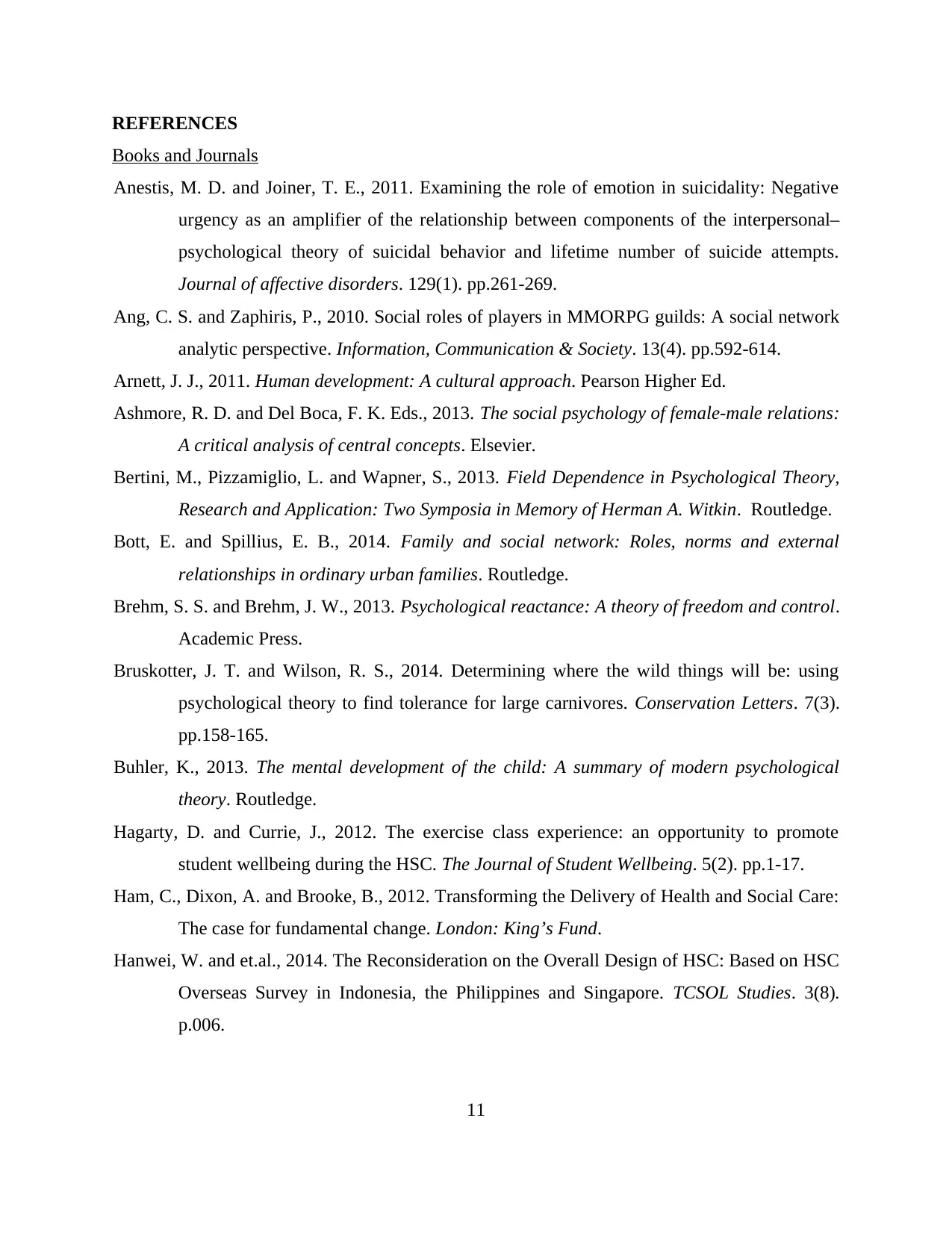
REFERENCES
Books and Journals
Anestis, M. D. and Joiner, T. E., 2011. Examining the role of emotion in suicidality: Negative
urgency as an amplifier of the relationship between components of the interpersonal–
psychological theory of suicidal behavior and lifetime number of suicide attempts.
Journal of affective disorders. 129(1). pp.261-269.
Ang, C. S. and Zaphiris, P., 2010. Social roles of players in MMORPG guilds: A social network
analytic perspective. Information, Communication & Society. 13(4). pp.592-614.
Arnett, J. J., 2011. Human development: A cultural approach. Pearson Higher Ed.
Ashmore, R. D. and Del Boca, F. K. Eds., 2013. The social psychology of female-male relations:
A critical analysis of central concepts. Elsevier.
Bertini, M., Pizzamiglio, L. and Wapner, S., 2013. Field Dependence in Psychological Theory,
Research and Application: Two Symposia in Memory of Herman A. Witkin. Routledge.
Bott, E. and Spillius, E. B., 2014. Family and social network: Roles, norms and external
relationships in ordinary urban families. Routledge.
Brehm, S. S. and Brehm, J. W., 2013. Psychological reactance: A theory of freedom and control.
Academic Press.
Bruskotter, J. T. and Wilson, R. S., 2014. Determining where the wild things will be: using
psychological theory to find tolerance for large carnivores. Conservation Letters. 7(3).
pp.158-165.
Buhler, K., 2013. The mental development of the child: A summary of modern psychological
theory. Routledge.
Hagarty, D. and Currie, J., 2012. The exercise class experience: an opportunity to promote
student wellbeing during the HSC. The Journal of Student Wellbeing. 5(2). pp.1-17.
Ham, C., Dixon, A. and Brooke, B., 2012. Transforming the Delivery of Health and Social Care:
The case for fundamental change. London: King’s Fund.
Hanwei, W. and et.al., 2014. The Reconsideration on the Overall Design of HSC: Based on HSC
Overseas Survey in Indonesia, the Philippines and Singapore. TCSOL Studies. 3(8).
p.006.
11
Books and Journals
Anestis, M. D. and Joiner, T. E., 2011. Examining the role of emotion in suicidality: Negative
urgency as an amplifier of the relationship between components of the interpersonal–
psychological theory of suicidal behavior and lifetime number of suicide attempts.
Journal of affective disorders. 129(1). pp.261-269.
Ang, C. S. and Zaphiris, P., 2010. Social roles of players in MMORPG guilds: A social network
analytic perspective. Information, Communication & Society. 13(4). pp.592-614.
Arnett, J. J., 2011. Human development: A cultural approach. Pearson Higher Ed.
Ashmore, R. D. and Del Boca, F. K. Eds., 2013. The social psychology of female-male relations:
A critical analysis of central concepts. Elsevier.
Bertini, M., Pizzamiglio, L. and Wapner, S., 2013. Field Dependence in Psychological Theory,
Research and Application: Two Symposia in Memory of Herman A. Witkin. Routledge.
Bott, E. and Spillius, E. B., 2014. Family and social network: Roles, norms and external
relationships in ordinary urban families. Routledge.
Brehm, S. S. and Brehm, J. W., 2013. Psychological reactance: A theory of freedom and control.
Academic Press.
Bruskotter, J. T. and Wilson, R. S., 2014. Determining where the wild things will be: using
psychological theory to find tolerance for large carnivores. Conservation Letters. 7(3).
pp.158-165.
Buhler, K., 2013. The mental development of the child: A summary of modern psychological
theory. Routledge.
Hagarty, D. and Currie, J., 2012. The exercise class experience: an opportunity to promote
student wellbeing during the HSC. The Journal of Student Wellbeing. 5(2). pp.1-17.
Ham, C., Dixon, A. and Brooke, B., 2012. Transforming the Delivery of Health and Social Care:
The case for fundamental change. London: King’s Fund.
Hanwei, W. and et.al., 2014. The Reconsideration on the Overall Design of HSC: Based on HSC
Overseas Survey in Indonesia, the Philippines and Singapore. TCSOL Studies. 3(8).
p.006.
11
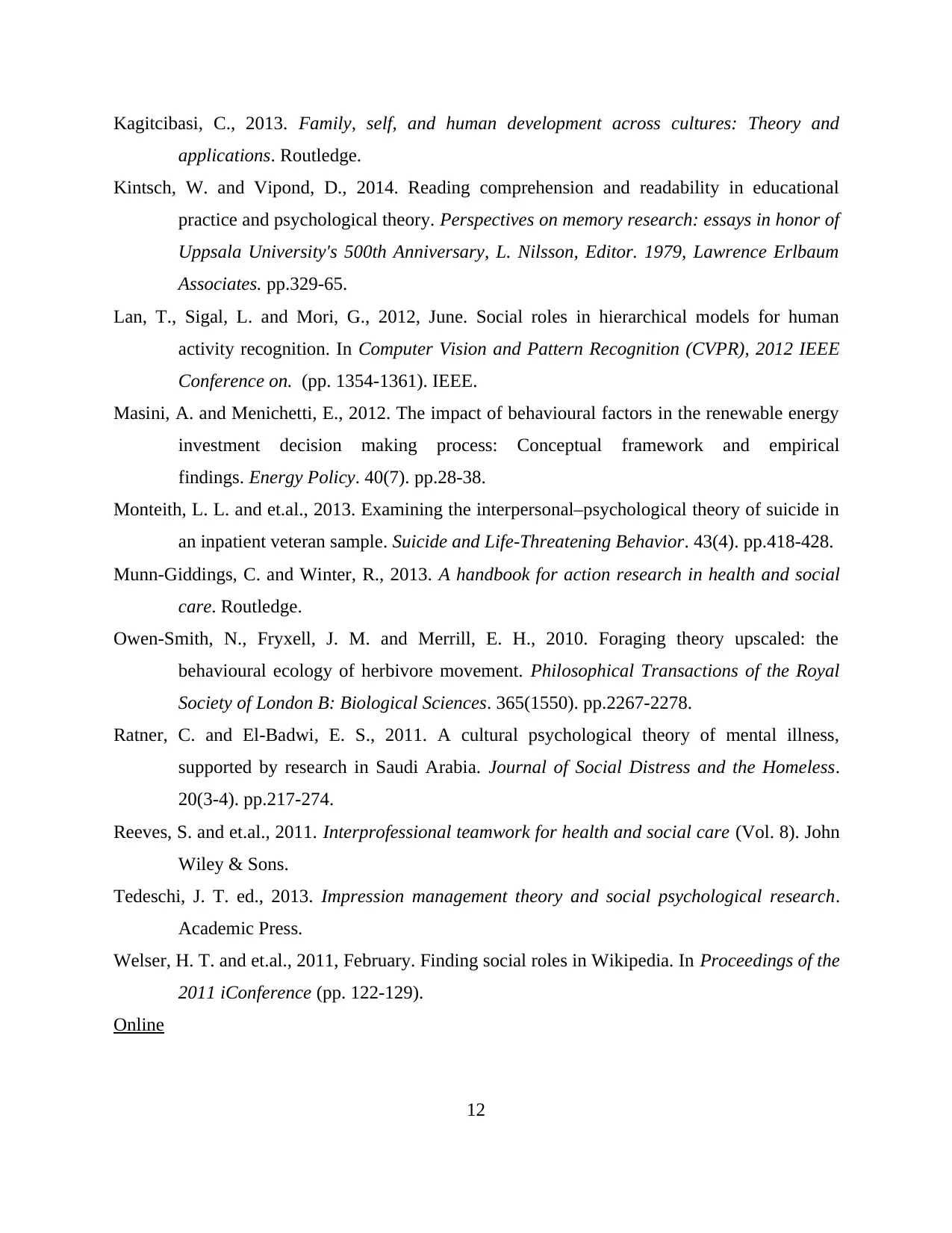
Kagitcibasi, C., 2013. Family, self, and human development across cultures: Theory and
applications. Routledge.
Kintsch, W. and Vipond, D., 2014. Reading comprehension and readability in educational
practice and psychological theory. Perspectives on memory research: essays in honor of
Uppsala University's 500th Anniversary, L. Nilsson, Editor. 1979, Lawrence Erlbaum
Associates. pp.329-65.
Lan, T., Sigal, L. and Mori, G., 2012, June. Social roles in hierarchical models for human
activity recognition. In Computer Vision and Pattern Recognition (CVPR), 2012 IEEE
Conference on. (pp. 1354-1361). IEEE.
Masini, A. and Menichetti, E., 2012. The impact of behavioural factors in the renewable energy
investment decision making process: Conceptual framework and empirical
findings. Energy Policy. 40(7). pp.28-38.
Monteith, L. L. and et.al., 2013. Examining the interpersonal–psychological theory of suicide in
an inpatient veteran sample. Suicide and Life-Threatening Behavior. 43(4). pp.418-428.
Munn-Giddings, C. and Winter, R., 2013. A handbook for action research in health and social
care. Routledge.
Owen-Smith, N., Fryxell, J. M. and Merrill, E. H., 2010. Foraging theory upscaled: the
behavioural ecology of herbivore movement. Philosophical Transactions of the Royal
Society of London B: Biological Sciences. 365(1550). pp.2267-2278.
Ratner, C. and El-Badwi, E. S., 2011. A cultural psychological theory of mental illness,
supported by research in Saudi Arabia. Journal of Social Distress and the Homeless.
20(3-4). pp.217-274.
Reeves, S. and et.al., 2011. Interprofessional teamwork for health and social care (Vol. 8). John
Wiley & Sons.
Tedeschi, J. T. ed., 2013. Impression management theory and social psychological research.
Academic Press.
Welser, H. T. and et.al., 2011, February. Finding social roles in Wikipedia. In Proceedings of the
2011 iConference (pp. 122-129).
Online
12
applications. Routledge.
Kintsch, W. and Vipond, D., 2014. Reading comprehension and readability in educational
practice and psychological theory. Perspectives on memory research: essays in honor of
Uppsala University's 500th Anniversary, L. Nilsson, Editor. 1979, Lawrence Erlbaum
Associates. pp.329-65.
Lan, T., Sigal, L. and Mori, G., 2012, June. Social roles in hierarchical models for human
activity recognition. In Computer Vision and Pattern Recognition (CVPR), 2012 IEEE
Conference on. (pp. 1354-1361). IEEE.
Masini, A. and Menichetti, E., 2012. The impact of behavioural factors in the renewable energy
investment decision making process: Conceptual framework and empirical
findings. Energy Policy. 40(7). pp.28-38.
Monteith, L. L. and et.al., 2013. Examining the interpersonal–psychological theory of suicide in
an inpatient veteran sample. Suicide and Life-Threatening Behavior. 43(4). pp.418-428.
Munn-Giddings, C. and Winter, R., 2013. A handbook for action research in health and social
care. Routledge.
Owen-Smith, N., Fryxell, J. M. and Merrill, E. H., 2010. Foraging theory upscaled: the
behavioural ecology of herbivore movement. Philosophical Transactions of the Royal
Society of London B: Biological Sciences. 365(1550). pp.2267-2278.
Ratner, C. and El-Badwi, E. S., 2011. A cultural psychological theory of mental illness,
supported by research in Saudi Arabia. Journal of Social Distress and the Homeless.
20(3-4). pp.217-274.
Reeves, S. and et.al., 2011. Interprofessional teamwork for health and social care (Vol. 8). John
Wiley & Sons.
Tedeschi, J. T. ed., 2013. Impression management theory and social psychological research.
Academic Press.
Welser, H. T. and et.al., 2011, February. Finding social roles in Wikipedia. In Proceedings of the
2011 iConference (pp. 122-129).
Online
12
⊘ This is a preview!⊘
Do you want full access?
Subscribe today to unlock all pages.

Trusted by 1+ million students worldwide
1 out of 13
Related Documents
Your All-in-One AI-Powered Toolkit for Academic Success.
+13062052269
info@desklib.com
Available 24*7 on WhatsApp / Email
![[object Object]](/_next/static/media/star-bottom.7253800d.svg)
Unlock your academic potential
Copyright © 2020–2025 A2Z Services. All Rights Reserved. Developed and managed by ZUCOL.





